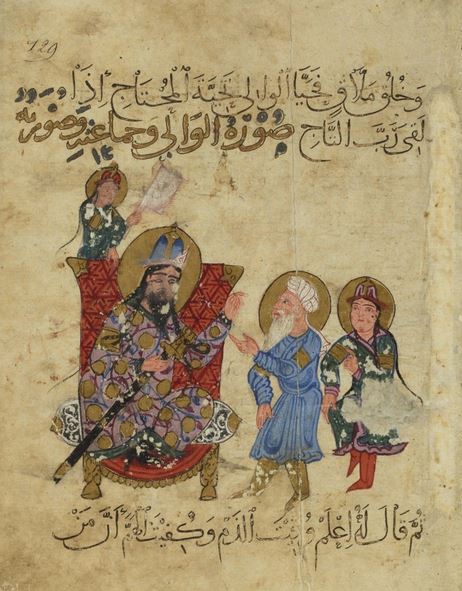
The following verse 10 of sūrat al-Fatḥ, as understood from the structure of the Qur’ānic text, confirms that whoever pledges allegiance to the Messenger is swearing allegiance to God:
Lo! Those who swear allegiance unto thee (Muhammad), swear allegiance only unto Allah. The Hand of Allah is above their hands. So whosoever breaketh his oath, breaketh it only to his soul's hurt; while whosoever keepeth his covenant with Allah, on him will He bestow immense reward. [Qur’ān, XLVIII (al-Fatḥ), 10]
CONSIDERED FROM ANOTHER angle this is one of the verses that strengthens the authority of the sovereign and establishes his status as a ruler supported by God Himself, whereas the truth of the matter is that the ruler is imposed upon the people and the nation, either by force of arms and slaughter, or by fraud or the manipulation of elections and the like.
To begin with, we need to interpret this verse briefly according to the commentary of al-Ṭabarī:
Allah the Most High said to His Messenger – as an honour and a glorification for him – that those who swear allegiance to you are only swearing allegiance to God, as evidenced in His words: Whoso obeyeth the messenger hath obeyed Allah[1] and The hand of God is over their hands, meaning He is present with them, hears what they way, sees where they are, and knows their innermost thoughts as well as that which they overtly express. For He, the Most High, is the one who is pledged allegiance through His Messenger, as in His saying: Lo! Allah hath bought from the believers their lives and their wealth because the Garden will be theirs: they shall fight in the way of Allah and shall slay and be slain. It is a promise which is binding on Him in the Torah and the Gospel and the Qur’an. Who fulfilleth His covenant better than Allah? Rejoice then in your bargain that ye have made, for that is the supreme triumph.[2] Ibn Abī Ḥātim said: ‘ʽAlī ibn Al-Ḥusayn told us (on the authority of Muḥammad ibn ʽAmr, on the authority of Abū Salāma, on the authority of Abū Hurayra): “The Messenger of God said: “He who draws his sword in God’s path has pledged allegiance to God.” ’[3]
Here, the Qur’ānic text makes the position of the Messenger equal and parallel to that of God, by saying, those who swear allegiance unto thee (Muhammad), swear allegiance only unto Allah, meaning that those who pledge allegiance to God and Muhammad are equivalent. And from the context of this Text, God it is who lowers down the curtain of allegiance, that is, upon a prophet, a messenger, or upon any other person. The verse, too, is a message to every nation, group or tribe, that any pledge of allegiance outside of this framework is invalid, since the pledge of allegiance to Muḥammad is the pledge of allegiance to God. The question here is: Does God need someone to pledge allegiance to Him? Surprisingly, Muḥammad says, “He who draws his sword in the path of God has pledged allegiance to God.” And this poses another question: Does God need killers for His sake, or does He need messengers of peace?
Nevertheless, this verse was exploited by the Arab Muslim rulers, by considering that their authority is a ‘divine’ authority, which works to render the mentality of the Arab Islamic peoples ignorant and superficial. Likewise, the entire Islamic tradition strengthened and supported the authority of the rulers, to the extent that it made these rulers ‘God’s shadow on earth’. In this respect the website Daʽwat al-Ḥaqq gives the following:
The origin of the hadith is from Abu Hurayra and runs: “The Sultan is the shadow of God on earth” and was considered a marfū’ hadith[4] transmitted by a number of the Companions and via several chains of transmission, all of which were collected by two ḥāfiz scholars al-Sakhāwī and al-Suyūṭī in two separate works. Al-‘Allāma al-Zarqānī in his Mukhtaṣar al-Ḥasana summarized the words of the ḥāfiz al-Sakhawi most succinctly and convincingly on what was intended by this, as was the method followed in this useful summary, when he said: it is a ḥasan hadith according to others, but as for additions to this wording, these contain ṣaḥiḥ reports such as the hadith of Abū Bakra as reported in al-Tirmidhi, Aḥmad and al-Ṭabarāī, and also ḥasan reports. (These jurists, imams and shaykhs are the ones the scholar d. Ali Al-Wari referred to as “the preachers for the sultans.”
The jurists greatly strengthened the position of the caliphs, princes and rulers and expounded upon their merits, therebyalso confirming their authority and rule. But the case of al-Ḥasan al-Baṣrī (642-728 AD) is of particular note. He was “an imam, a judge and a hadith scholar and one of the client intellectuals to some of the most prominent personalities in the era of early Islam. He lived in Basra and enjoyed an authoritative status. He would address rulers, directly ‘commanding them to good and forbidding them from evil’, and feared no one.” He deviated from the usual practice and invented imaginary virtues that could apply neither to the caliphs of the Muslims nor to the rulers of the Arabs in general. On the website Quṣṣat al-Islām is featured al-Ḥasan al-Baṣrī’s response to the caliph ‘Umar ibn ‘Abd al-ʽAzīz concerning the qualities of the just ruler. I quote:
Al-Basri wrote: ‘Know, O Commander of the Faithful, that God made the just imam the pillar of strength for all those who stumble, the target for every unjust person, and the source of righteousness against all who are corrupt, he is the strength for all those who are weak, the remedy for all those who are oppressed, and the refuge for all those who suffer distress’.
The question here is whether any of these attributes applied or could apply to any ‘Muslim’ caliph, or ruler, or leader or president.
Others set their sights on the one succeeding the Messenger of Islam, believing that he was Muhammad’s successor in every matter, and thus believed that he merited what Muḥammad had in terms of authority and its privileges in the obedience to be paid by the governed. This was also reinforced by verse 59 of sūrat al-Nisā’:
O ye who believe! Obey Allah, and obey the messenger and those of you who are in authority; and if ye have a dispute concerning any matter, refer it to Allah and the messenger if ye are (in truth) believers in Allah and the Last Day. That is better and more seemly in the end.
On the website of Imam Bin Bāz, for example, we have a glorification of the ruler’s continued authority to rule, and an emphasis on not deviating from obedience even to the unjust ruler:
The meaning of this verse is confined as to its intent: obedience to them for all that is good in what they do, that Muslims are to obey those in charge if they for the good but not for rebellion, so if they command to rebel, they should not obey that command, but nevertheless ‘it is not permissible to revolt against them.’
This conception has made of the ruler a veritable earthly lord of mankind, because the ruler a priori becomes unique, inviolable and to be supported according to the Qur’ānic text and Islamic tradition. Nor is he to be asked to review any order he issues – on the grounds that his is ‘the command and the prohibition’, and the people are thus to obey and implement his orders.

Suggested Reading
Verse 10 of Sūrat al-Fatḥ, and sentiments similar to this populating the Islamic tradition, became practically reinforced in certain periods in the past ever since the Saqīfat Banī Sāʽida event,[5] passing through the Umayyad and Abbasid states through to the period of Ottoman rule, and the states that emerged from it. But in the twenty-first century everything has now become crystal clear to people, ans these can no longer submit themselves the authority of oppressive rulers, now that they have achieved societal awareness and cultural openness.
[1] Qur’ān IV (al-Nisā’) 80.
[2] Qur’ān IX (al-Tawba), 111.
[3] The text is frequently cited, cf Ibn Kathīr’s tafsīr.
[4] That is, a hadīth which a Companion narrates directly from the Prophet. See Glossary: ‘hadith’ (Ed.)
[5] The discussions at Saqīfat Banī Sā‘ida concerned the succession to the Prophet following his death, and as a result of which Abu Bakr was nominated his successor (khalīfa, ‘Caliph’). (Ed.)
Main image: ‘Picture of a Wali’ in the Maqâmât of Abû Muḥammad al-Qâsim ibn ʿAlî al-Ḥarîrî (1201-1300).
